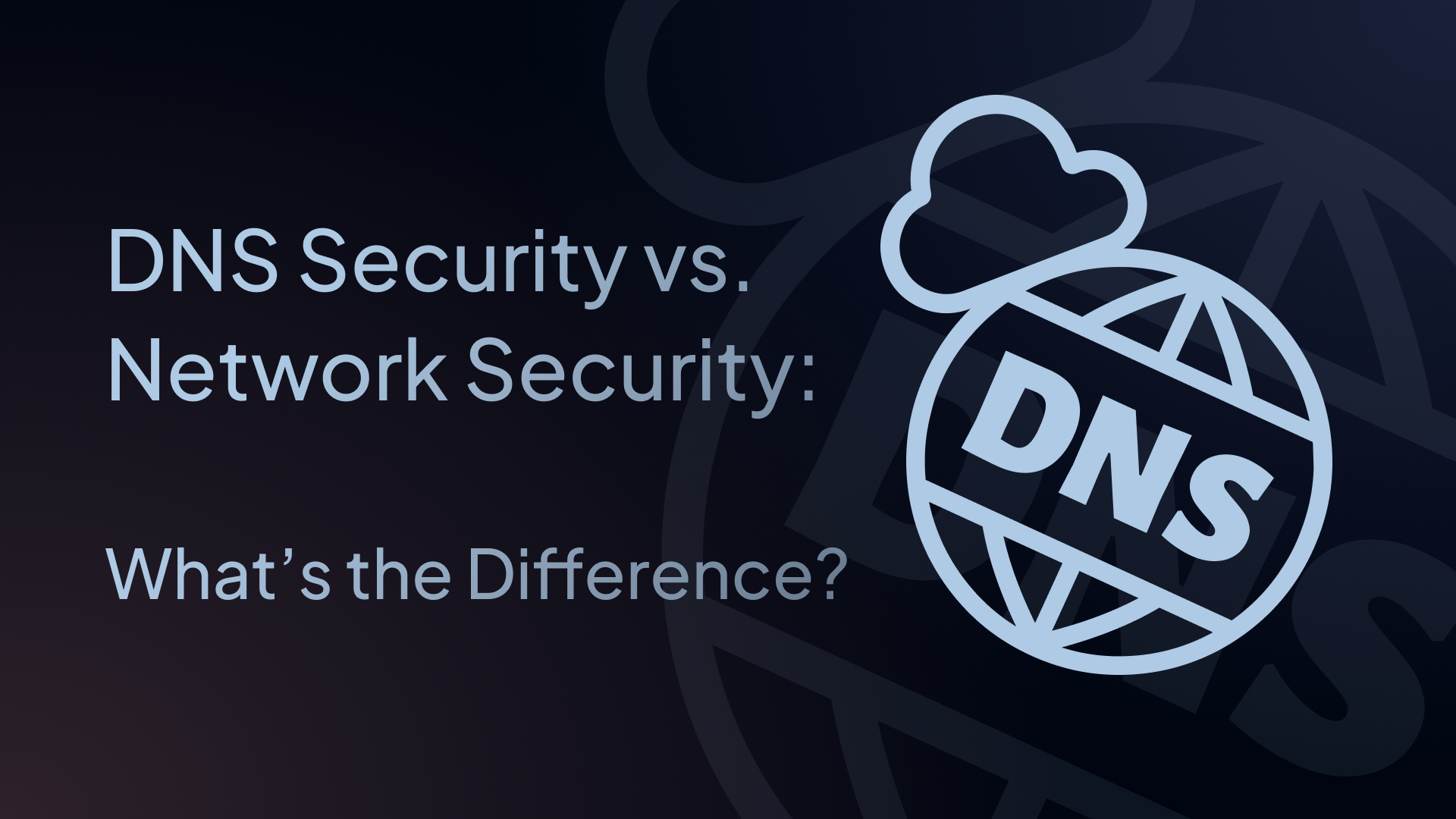DNS Security vs Network Security: What’s the Difference?
The term DNS security and network security are often used interchangeably, but there are important differences between the two.

The main difference between DNS security and network security is focus.
DNS security protects the Domain Name System (DNS) from malware, data exfiltration, spoofing, and hijacking. Network security protects the entire network infrastructure–the devices, data flows, and services that keep an organization connected–from unauthorized access and various other threats.
Consider this analogy: network security protects an entire city's infrastructure (roads, power, water systems, etc.), while DNS Security is akin to protecting the road signs and street names that guide drivers to their destinations. If attackers tamper with those signs, people end up in the wrong place–sometimes a dangerous one.
Deep Dive into DNS Security
DNS security is the practice of securing this specific translation process. Its core purpose is to ensure that when a user tries to visit a website, they are directed to the legitimate IP address and not a malicious one.
DNS-related security threats include:
- Spoofing/Poisoning: A hacker corrupts a DNS server's cache with forged DNS records, causing users to be redirected to fake, malicious websites.
- Hijacking: Intercepting and altering DNS queries to point to a malicious server, or manipulating DNS queries by altering DNS settings.
- Tunneling: Using DNS queries to secretly exfiltrate data or create a covert communication channel, bypassing other security controls.
- DDoS Attacks: Overwhelming a DNS server with traffic, making it unable to respond to legitimate requests and taking websites offline.
There are security protocols available to combat these threats. These include:
- DNSSEC (DNS Security Extensions): Adds cryptographic signatures to DNS records, allowing a resolver to verify that the data came from an authoritative source and hasn't been tampered with. It's about authentication and integrity.
- DNS over HTTPS (DoH) / DNS over TLS (DoT): Encrypts DNS queries between your device and the DNS resolver. This prevents eavesdroppers on the network from seeing which websites you are trying to visit and tampering with your queries.
- DNS Filtering: Using DNS filtering to block access to known malicious or unwanted domains (e.g., phishing sites, malware distribution points, or adult content).
DNS security isn’t automatic, and you may not always get adequate protection with most free DNS services.
However, the top DNS security products, such as Control D, offer privacy-focused, customizable DNS features designed to block malicious domains, trackers, and unwanted content.
Deep Dive into Network Security
Network security is a comprehensive discipline focused on protecting the entire network infrastructure, the data that flows across it, and the devices connected to it. Its goal is to create a secure environment for users, computers, and programs to perform their functions. Some common terms to know:
- Unauthorized access: Preventing hackers from gaining entry to the network.
- Data interception: Stopping attackers from reading sensitive data as it travels across the network.
- Malware and exploits: Blocking malicious software from infecting systems.
- Network disruption: Preventing attacks that would degrade or halt services (e.g., Distributed Denial of Service (DDoS) attacks against web servers, DNS infrastructure, or other critical services).
Typical security measures that protect against attacks on networks include:
- Firewalls: Act as a gatekeeper, controlling incoming and outgoing network traffic based on security rules.
- Virtual private networks (VPNs): Create an encrypted tunnel over a public network to secure remote access.
- Intrusion detection/prevention systems (IDS/IPS): Monitor network traffic for suspicious activity and known attack patterns, alerting (IDS) or actively blocking (IPS) them.
- Network access control (NAC): Ensures only authorized and compliant devices can connect to the network.
- Segmentation: Dividing the network into segments to limit an attacker's lateral movement if they breach one area.
Final Verdict: You Need Both
DNS security is not a replacement for network security; it is a critical component of it. Network security is incomplete without specific measures to protect DNS, as it is a foundational and frequently targeted protocol. Securing DNS alone does nothing to stop other network-based threats like phishing emails, vulnerable services, or unauthorized access attempts.
For a truly secure environment, you need both: network security to protect your infrastructure and data broadly, and DNS security to safeguard the integrity and privacy of the system that directs nearly all internet traffic.
Services like Control D can help reinforce that trust by letting users take granular control over what gets blocked, where traffic goes, and how DNS requests are handled.

